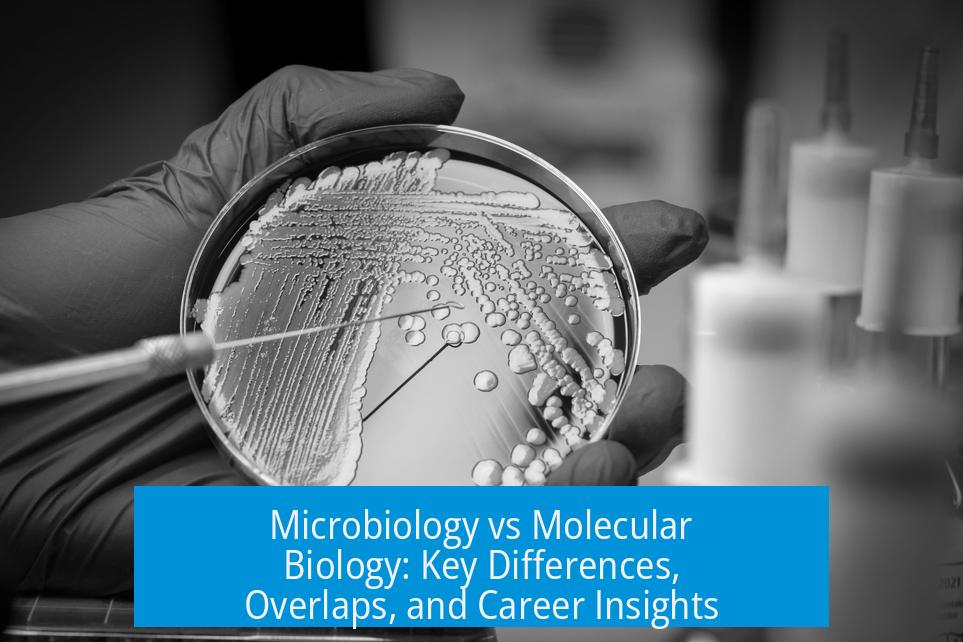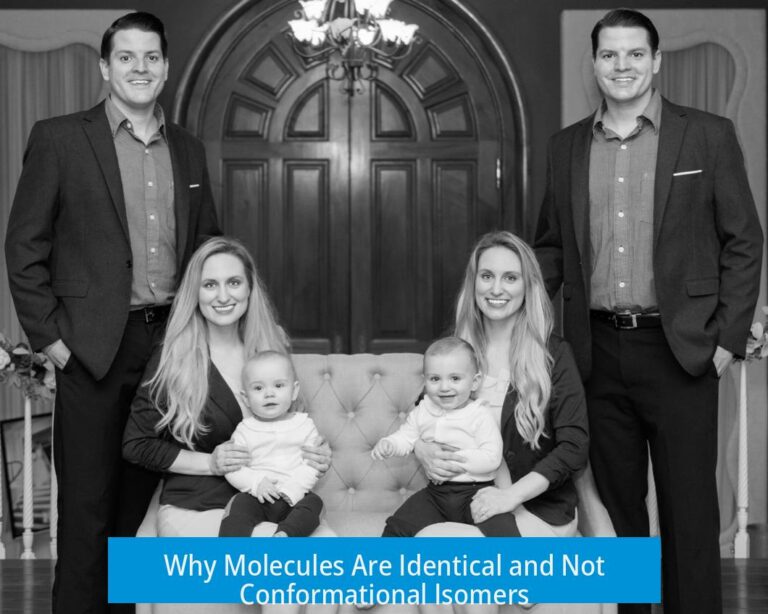Microbiology vs Molecular Biology: Core Differences and Connections
Microbiology focuses on microorganisms like bacteria and fungi, their cultivation, classification, and usage in industries, while molecular biology studies molecular components within cells such as DNA, RNA, proteins, and mechanisms underlying cellular processes.
This article clarifies distinctions, overlaps, and career implications of microbiology and molecular biology. It also explores how these fields integrate and offers guidance for students deciding between them.
1. Definitions and Primary Focus
Microbiology
Microbiology studies microorganisms including bacteria, fungi, and other microbes. It covers methods to culture, identify, classify, and apply these organisms industrially. It operates largely at the cellular level, examining whole microbes in their biological context.
The field emphasizes living organisms as a whole, from their structural features to their ecological roles. It is diverse, covering many species and environmental niches. Microbiology today increasingly incorporates molecular techniques to study microbes more deeply.
Molecular Biology
Molecular biology investigates the internal molecular components of cells. It delves beyond cellular structures to mechanisms involving DNA, RNA, proteins, enzymes, and receptors. The focus lies on molecular pathways and gene expression.
Molecular biology traditionally centers on human or mammalian cells, including disease-related research such as cancer. The field explores fundamental biological processes at a subcellular level.
2. Curriculum Overlap and Differences
Shared Ground
- Both curricula often share core coursework, including biochemistry and genetics.
- Students of one discipline frequently take introductory courses in the other to gain complementary insight.
- Bioinformatics is increasingly common to both disciplines for data analysis.
- Many universities situate both within the same college or department due to overlapping content.
Distinct Emphases
- Microbiology programs cover a broader range of organisms and their ecological and industrial contexts.
- Molecular biology curricula focus more narrowly on molecular mechanisms in specific cell types, especially human or mammalian.
- Curriculum selection may depend on institutional structure and personal career goals.
3. Career and Research Pathways
Microbiology Careers
- Engage in industrial biotechnology and fermentation processes.
- Work in microbial ecology, environmental testing, and pathogen research.
- Develop applications utilizing metabolic diversity of microbes.
Molecular Biology Careers
- Engage in genetics, gene therapy, and disease-related research.
- Focus on cellular and molecular pathways in human health and disease.
- Work with genetic engineering, protein engineering, and molecular diagnostics.
Integration and Multidisciplinarity
Many modern research projects blend microbiology and molecular biology. Molecular biology techniques underlie much microbiology research, especially with microorganisms that are difficult to culture traditionally.
Bioinformatics and biochemical methods form common tools across fields. Molecular microbiology is a hybrid area combining cellular molecular analysis with microbial context.
4. Practical Illustrations of Field Intersection
Metagenomics and Microbial Ecology
Many microbes in nature are unculturable by lab methods. Metagenomics uses molecular biology tools to analyze genetic material directly from environmental samples. Gene prediction algorithms and gene ontology analyses reveal metabolic interactions among microbial communities.
Microbial metabolites often serve as substrates for other organisms’ pathways, highlighting complex ecological interdependencies.
Industrial Application Example
Industrial microbiologists employ molecular biology to optimize microbial strains for producing valuable compounds. Techniques include genetic manipulation and fermentation scale-up from laboratory to bioreactors.
Analytical tools like chromatography and mass spectrometry assist in studying metabolite profiles and optimizing production processes.
Technology and Tool Development
Molecular biology advances, such as CRISPR gene editing, originated in microbial systems. However, many molecular biologists rely on tools from chemistry and engineering. Investment in developing new methods and instruments is often multidisciplinary.
5. Advice for Students Choosing Between Microbiology and Molecular Biology
- Evaluate course offerings and career goals before committing.
- Gain foundational knowledge in both fields where possible; many universities allow flexible course selections.
- Focus on what inspires you—working with whole organisms or studying molecular mechanisms.
- Graduate specialization is an option to deepen expertise after broad undergraduate studies.
- Cross-training across molecular biology and microbiology opens more research and career opportunities.
6. Trends of Field Integration
Traditional boundaries between microbiology and molecular biology are diminishing. Molecular techniques now underpin most microbiological studies. Data science and bioinformatics enhance both fields. Researchers often integrate knowledge from genetics, molecular systems, and microbial ecology.
The convergence supports comprehensive approaches in biomedical, environmental, and industrial research.
Summary Table: Microbiology vs Molecular Biology
| Aspect | Microbiology | Molecular Biology |
|---|---|---|
| Focus | Study of microorganisms (bacteria, fungi), culturing, identification, classification, industrial applications | Cellular organelles, DNA, RNA, proteins, molecular pathways inside cells |
| Curriculum | Broader organismal diversity; includes metabolic pathways in microbes | Mammalian/human cell focus; molecular mechanisms in health and disease |
| Careers | Industrial biotech, fermentation, microbial ecology, environmental microbiology | Genetic engineering, molecular diagnostics, disease research, protein engineering |
| Methodological Overlap | Requires molecular biology, biochemistry, bioinformatics skills | Overlaps with microbiology; high molecular technique usage |
| Example Applications | Fermentation processes, metagenomics, microbial classification | Gene cloning, CRISPR, protein studies, molecular pathway analysis |
| Interdisciplinary Trends | Increasing integration with molecular biology and data sciences | Adoption of tools from chemistry, bioinformatics, engineering |
Key Takeaways
- Microbiology deals with diverse microorganisms including practical culturing and ecological roles.
- Molecular biology targets molecular and genetic mechanisms within cells, mainly human or mammalian.
- The fields share significant curriculum overlap and increasingly intersect in research.
- Career options diverge but often complement each other in biotechnology, health, and environmental sectors.
- Students benefit from exposure to both disciplines to enhance understanding and versatility.
- Modern biology demands multidisciplinary approaches combining molecular techniques and organismal studies.
What distinguishes microbiology from molecular biology in study focus?
Microbiology studies a wide range of microorganisms and their classification. Molecular biology focuses on cellular molecules like DNA and enzymes, mainly in human or mammalian cells.
How much do microbiology and molecular biology curricula overlap?
Both majors share many core courses. It’s common for students to take classes in the other field to gain a well-rounded understanding.
This overlap reflects the interplay between microorganism study and molecular processes.
Can a career in microbiology involve molecular biology techniques?
Yes, microbiology labs often rely on molecular biology tools daily. Molecular microbiology blends both fields, especially in research and industry.
Is it necessary to specialize early in microbiology or molecular biology?
No, introductory courses can help decide your interest. Learning basics from both fields before specializing is recommended.
How are modern trends affecting microbiology and molecular biology?
The lines between the two are blurring as multidisciplinary fields like bioinformatics and data science grow. Microbiology increasingly incorporates molecular biology methods.





Leave a Comment